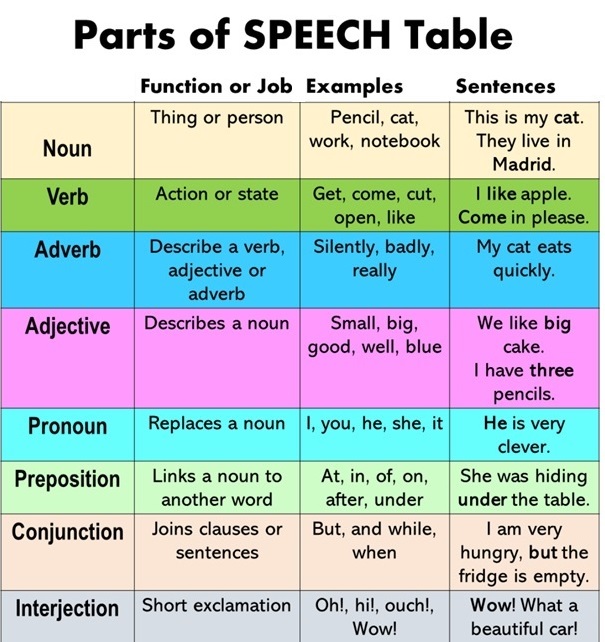8 گروه واژه گان در زبان انگلیسی

در زبان انگلیسی واژه ها به 8 گروه تقسیم می شوند، باید بدونیم که با جابجایی هر واژه، گروه واژگانی می تواند تغییر کند، و معنی آن واژه نیز تغییر می کند.
۱-اسم: نام هر چیز، افراد، مکان ها نام معمولی (common noun)، مانند: کتاب، ماشین (قابل شمارش countable و لمس کردنی concrete noun هستند)؛ عشق، دوستی (انتزاعی یا abstract noun/ concept هستند)؛ نام های غیر قابل شمارش( uncountable noun)، مانند: آب، شکر؛ نام خاص (proper noun)، مانند: دماوند، فردوسی؛ نام های مرکب (compound noun)؛ نام های گروهی (collective noun)
نکته مهم: نام ها در جملات به عنوان فاعل (کننده ی کار) و یا مفعول (دریافت کننده ی کار) بکار می روند.
2-فعل: بخشی از گفتار است که برای بیان عمل (action) یا حالتی (state) از بودن یا ارتباط بین فاعل و مفعول در جمله بکار می رود. افعال اکشن یا عملکردنی مانند: خوردن، نوشیدن to eat، نوشتن to write، خواندن to read؛ در این افعال یک اتفاقی می افتد. افعال stative بیانگر یک حالت هستند. نکته مهم: این افعال در زمانی که دارای مفهوم دایمی هستند بصورت استمراری نمی آیند و در صورتی که معنای موقت بدهند می توان بصورت استمراری استفاده شوند، فقط معنای آنها تغییر می کند. مانند: عاشق شدن to love، داشتن to have/to own، امیدوار بودن to hope.
3-قید: یک فعل، صفت، قید دیگر، یا یک جمله را توصیف می کند؛ و انواع متفاوتی دارد. مانند: قید حالت که با اضافه کردن ly به انتهای صفت تشکیل می شود به جز costly, deadly friendly, kindly, likely, lively, manly, timely که صفت می باشند نه قید. قید تکرار مانند: همیشه، معمولا، اغلب، بعضی اوقات، به ندرت، هرگز. قید زمان مانند: قبلا، الان، بعدا، زود، دیر. قید مکان، مانند: داخل، بیرون، بالا، پایین.
4-صفت: یک اسم (نام) را توصیف می کند، معمولا قبل از اسم می آید و یا بعد از افعال بودن، و چند فعل دیگر می آید.
مانند:
Lisa is wearing a sleeveless shirt today.
It smells gross in the locker room.
Max smells bad.
This soup is not edible.
She wore a beautiful dress.
He writes meaningless letters.
This shop is much nicer.
She wore a beautiful dress.
Ben is an adorable baby.
Linda's hair is gorgeous.
5-ضمیر: جایگزین یک اسم می شود. مانند: I, me, he, she, herself, you, it, that, they, each, few, many, who, whoever, whose, someone, everybody و دیگر ضمایر.
6-حرف اضافه: یک اسم (نام) را به دیگر واژگان متصل می کند. مانند: in, at, on, of, to, by, with, عبارت هایی مانند: in front of, next to, instead of, حروف اضافه در انگلیسی بیشتر موارد به همراه یک سری اصطلاحات ثابت بکار برده می شوند.
7-حرف ربط: عبارات یا جملات را به یکدیگر متصل می کند.
مانند: And, or, so, since, for, because, as, but, yet, still, while, as soon as, therefore, moreover, in case, though, although, even though.
8-واژه تعجبی: واژه های کوتاهی هستند که برای بیان انواع حالات تعجبی بکار می روند.
مانند:
Hurray! We won the game.
Ouch! That really hurt badly.
Wow! That is a beautiful dress indeed.
Oh my God! That was unexpected.
Whoa! That guy is unbelievably huge.
In English we have 8 types of words
In English we have 8 types of words:
1- noun: things, people, places, concept (abstract), name of people or place, e.g.,
river, door, car (noun, concrete), love (noun, abstract), friendship, book,
water (noun, uncountable) some water, any water
Notice: Nouns can come as subject (doer or an action) or object (receiver of an action) in a sentence.
2-verb: an action e.g., go, eat, do, play. state (think, have)
3-adjective: describes a noun, they come before a noun, e.g., a
good boy.
Can come after to be (am, is, are) or some verbs, e.g., seem, appear, sound, e.g., this sounds great. He is a nice boy.
4-adverb: describe a verb, describe an adverb, describe a sentence, describe an adjective
5-pronoun: can come instead of a noun, e.g., I go to school.
Hamid goes to school.
Personal pronoun: I, you, we, they, you, he, she, it.
Object pronoun, reflexive pronoun, possessive pronoun
6-preposition: usually come before a noun / pronoun and it shows its relationship with other words in a sentence.
7-conjunction: connect clauses to each other. coordinate
conjunction (and, or, but, nor, yet, so, for: fanboys) which can make compound
sentences, e.g., I go to work and write some papers.
Subordinate conjunction (although, however, …) which make complex sentences.
8-interjection: A short
sound which expresses emotions.
e.g., ah! Aha! Ow! Ouch!
